Reflective Portfolio on Pursuing a Master's Degree in Physiotherapy
VerifiedAdded on 2024/04/29
|6
|1959
|119
AI Summary
This reflective portfolio outlines the motivations, goals, and steps towards pursuing a master's degree in Physiotherapy, specializing in Learning Disabilities. It discusses the role of a physiotherapist, current issues in the profession, skills needed, and personal development plans. SMART objectives are set to bridge skill gaps and enhance expertise in sports massage therapy, research specialization, expand business, and pursue further qualifications.
Contribute Materials
Your contribution can guide someone’s learning journey. Share your
documents today.
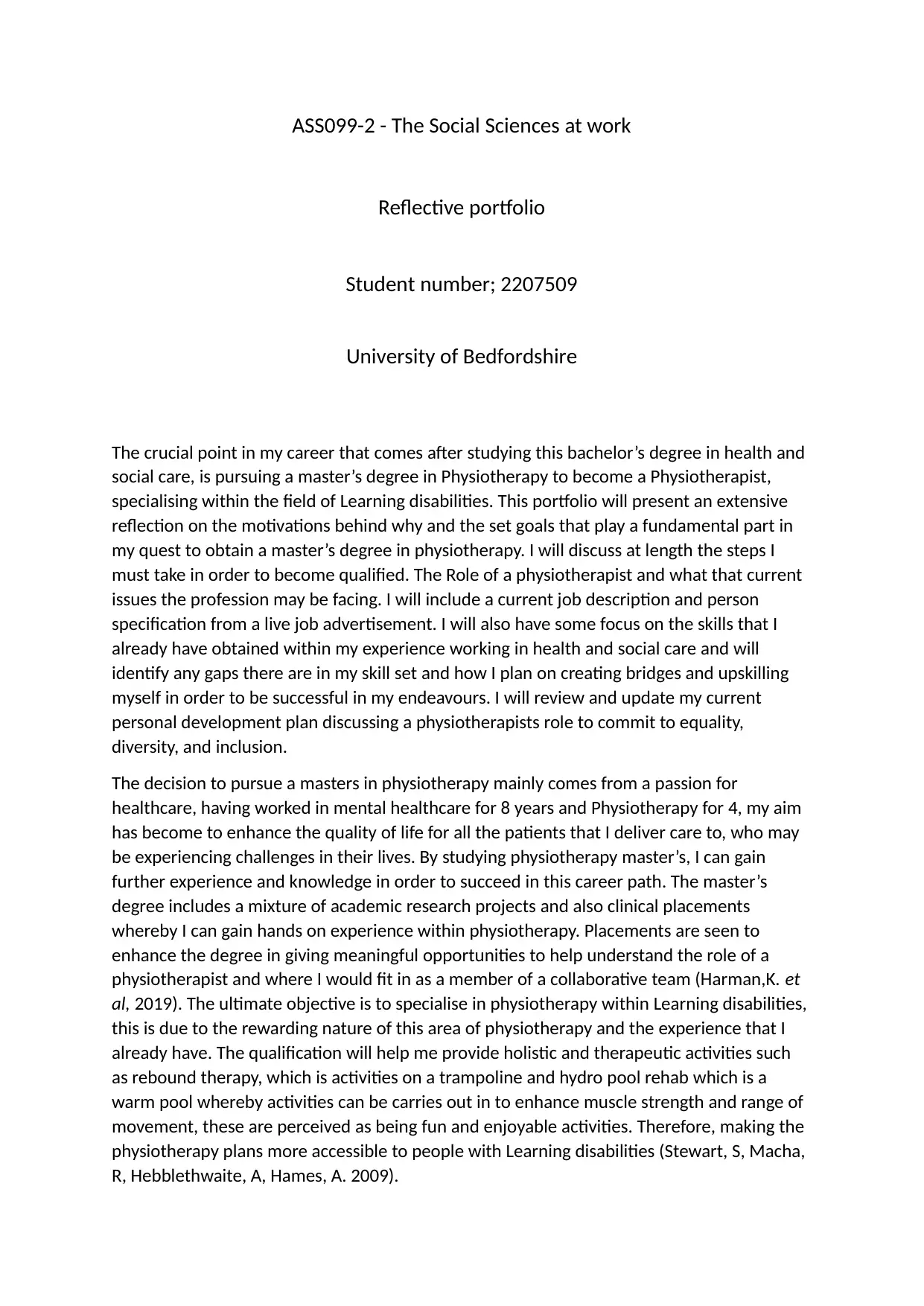
ASS099-2 - The Social Sciences at work
Reflective portfolio
Student number; 2207509
University of Bedfordshire
The crucial point in my career that comes after studying this bachelor’s degree in health and
social care, is pursuing a master’s degree in Physiotherapy to become a Physiotherapist,
specialising within the field of Learning disabilities. This portfolio will present an extensive
reflection on the motivations behind why and the set goals that play a fundamental part in
my quest to obtain a master’s degree in physiotherapy. I will discuss at length the steps I
must take in order to become qualified. The Role of a physiotherapist and what that current
issues the profession may be facing. I will include a current job description and person
specification from a live job advertisement. I will also have some focus on the skills that I
already have obtained within my experience working in health and social care and will
identify any gaps there are in my skill set and how I plan on creating bridges and upskilling
myself in order to be successful in my endeavours. I will review and update my current
personal development plan discussing a physiotherapists role to commit to equality,
diversity, and inclusion.
The decision to pursue a masters in physiotherapy mainly comes from a passion for
healthcare, having worked in mental healthcare for 8 years and Physiotherapy for 4, my aim
has become to enhance the quality of life for all the patients that I deliver care to, who may
be experiencing challenges in their lives. By studying physiotherapy master’s, I can gain
further experience and knowledge in order to succeed in this career path. The master’s
degree includes a mixture of academic research projects and also clinical placements
whereby I can gain hands on experience within physiotherapy. Placements are seen to
enhance the degree in giving meaningful opportunities to help understand the role of a
physiotherapist and where I would fit in as a member of a collaborative team (Harman,K. et
al, 2019). The ultimate objective is to specialise in physiotherapy within Learning disabilities,
this is due to the rewarding nature of this area of physiotherapy and the experience that I
already have. The qualification will help me provide holistic and therapeutic activities such
as rebound therapy, which is activities on a trampoline and hydro pool rehab which is a
warm pool whereby activities can be carries out in to enhance muscle strength and range of
movement, these are perceived as being fun and enjoyable activities. Therefore, making the
physiotherapy plans more accessible to people with Learning disabilities (Stewart, S, Macha,
R, Hebblethwaite, A, Hames, A. 2009).
Reflective portfolio
Student number; 2207509
University of Bedfordshire
The crucial point in my career that comes after studying this bachelor’s degree in health and
social care, is pursuing a master’s degree in Physiotherapy to become a Physiotherapist,
specialising within the field of Learning disabilities. This portfolio will present an extensive
reflection on the motivations behind why and the set goals that play a fundamental part in
my quest to obtain a master’s degree in physiotherapy. I will discuss at length the steps I
must take in order to become qualified. The Role of a physiotherapist and what that current
issues the profession may be facing. I will include a current job description and person
specification from a live job advertisement. I will also have some focus on the skills that I
already have obtained within my experience working in health and social care and will
identify any gaps there are in my skill set and how I plan on creating bridges and upskilling
myself in order to be successful in my endeavours. I will review and update my current
personal development plan discussing a physiotherapists role to commit to equality,
diversity, and inclusion.
The decision to pursue a masters in physiotherapy mainly comes from a passion for
healthcare, having worked in mental healthcare for 8 years and Physiotherapy for 4, my aim
has become to enhance the quality of life for all the patients that I deliver care to, who may
be experiencing challenges in their lives. By studying physiotherapy master’s, I can gain
further experience and knowledge in order to succeed in this career path. The master’s
degree includes a mixture of academic research projects and also clinical placements
whereby I can gain hands on experience within physiotherapy. Placements are seen to
enhance the degree in giving meaningful opportunities to help understand the role of a
physiotherapist and where I would fit in as a member of a collaborative team (Harman,K. et
al, 2019). The ultimate objective is to specialise in physiotherapy within Learning disabilities,
this is due to the rewarding nature of this area of physiotherapy and the experience that I
already have. The qualification will help me provide holistic and therapeutic activities such
as rebound therapy, which is activities on a trampoline and hydro pool rehab which is a
warm pool whereby activities can be carries out in to enhance muscle strength and range of
movement, these are perceived as being fun and enjoyable activities. Therefore, making the
physiotherapy plans more accessible to people with Learning disabilities (Stewart, S, Macha,
R, Hebblethwaite, A, Hames, A. 2009).
Secure Best Marks with AI Grader
Need help grading? Try our AI Grader for instant feedback on your assignments.
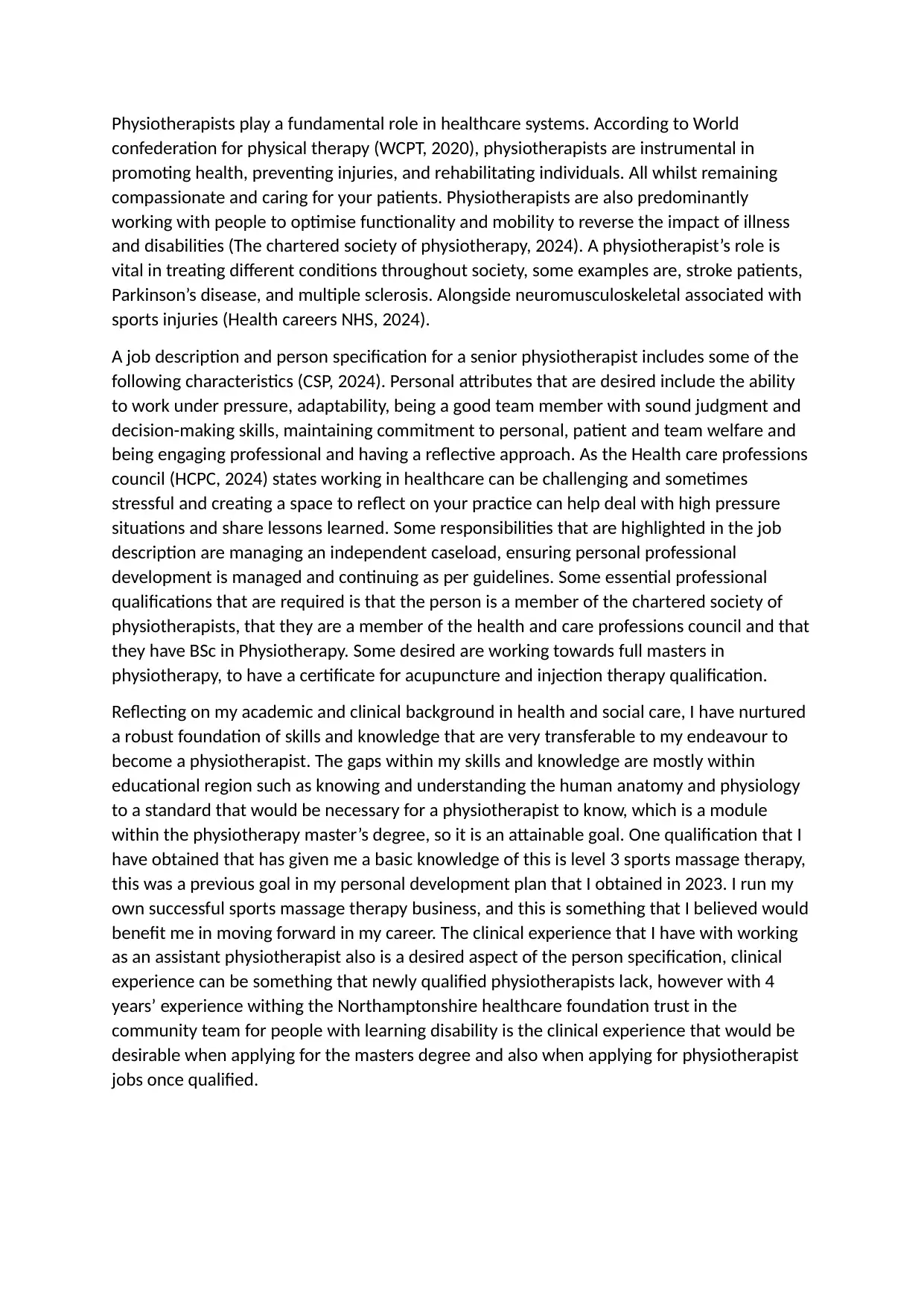
Physiotherapists play a fundamental role in healthcare systems. According to World
confederation for physical therapy (WCPT, 2020), physiotherapists are instrumental in
promoting health, preventing injuries, and rehabilitating individuals. All whilst remaining
compassionate and caring for your patients. Physiotherapists are also predominantly
working with people to optimise functionality and mobility to reverse the impact of illness
and disabilities (The chartered society of physiotherapy, 2024). A physiotherapist’s role is
vital in treating different conditions throughout society, some examples are, stroke patients,
Parkinson’s disease, and multiple sclerosis. Alongside neuromusculoskeletal associated with
sports injuries (Health careers NHS, 2024).
A job description and person specification for a senior physiotherapist includes some of the
following characteristics (CSP, 2024). Personal attributes that are desired include the ability
to work under pressure, adaptability, being a good team member with sound judgment and
decision-making skills, maintaining commitment to personal, patient and team welfare and
being engaging professional and having a reflective approach. As the Health care professions
council (HCPC, 2024) states working in healthcare can be challenging and sometimes
stressful and creating a space to reflect on your practice can help deal with high pressure
situations and share lessons learned. Some responsibilities that are highlighted in the job
description are managing an independent caseload, ensuring personal professional
development is managed and continuing as per guidelines. Some essential professional
qualifications that are required is that the person is a member of the chartered society of
physiotherapists, that they are a member of the health and care professions council and that
they have BSc in Physiotherapy. Some desired are working towards full masters in
physiotherapy, to have a certificate for acupuncture and injection therapy qualification.
Reflecting on my academic and clinical background in health and social care, I have nurtured
a robust foundation of skills and knowledge that are very transferable to my endeavour to
become a physiotherapist. The gaps within my skills and knowledge are mostly within
educational region such as knowing and understanding the human anatomy and physiology
to a standard that would be necessary for a physiotherapist to know, which is a module
within the physiotherapy master’s degree, so it is an attainable goal. One qualification that I
have obtained that has given me a basic knowledge of this is level 3 sports massage therapy,
this was a previous goal in my personal development plan that I obtained in 2023. I run my
own successful sports massage therapy business, and this is something that I believed would
benefit me in moving forward in my career. The clinical experience that I have with working
as an assistant physiotherapist also is a desired aspect of the person specification, clinical
experience can be something that newly qualified physiotherapists lack, however with 4
years’ experience withing the Northamptonshire healthcare foundation trust in the
community team for people with learning disability is the clinical experience that would be
desirable when applying for the masters degree and also when applying for physiotherapist
jobs once qualified.
confederation for physical therapy (WCPT, 2020), physiotherapists are instrumental in
promoting health, preventing injuries, and rehabilitating individuals. All whilst remaining
compassionate and caring for your patients. Physiotherapists are also predominantly
working with people to optimise functionality and mobility to reverse the impact of illness
and disabilities (The chartered society of physiotherapy, 2024). A physiotherapist’s role is
vital in treating different conditions throughout society, some examples are, stroke patients,
Parkinson’s disease, and multiple sclerosis. Alongside neuromusculoskeletal associated with
sports injuries (Health careers NHS, 2024).
A job description and person specification for a senior physiotherapist includes some of the
following characteristics (CSP, 2024). Personal attributes that are desired include the ability
to work under pressure, adaptability, being a good team member with sound judgment and
decision-making skills, maintaining commitment to personal, patient and team welfare and
being engaging professional and having a reflective approach. As the Health care professions
council (HCPC, 2024) states working in healthcare can be challenging and sometimes
stressful and creating a space to reflect on your practice can help deal with high pressure
situations and share lessons learned. Some responsibilities that are highlighted in the job
description are managing an independent caseload, ensuring personal professional
development is managed and continuing as per guidelines. Some essential professional
qualifications that are required is that the person is a member of the chartered society of
physiotherapists, that they are a member of the health and care professions council and that
they have BSc in Physiotherapy. Some desired are working towards full masters in
physiotherapy, to have a certificate for acupuncture and injection therapy qualification.
Reflecting on my academic and clinical background in health and social care, I have nurtured
a robust foundation of skills and knowledge that are very transferable to my endeavour to
become a physiotherapist. The gaps within my skills and knowledge are mostly within
educational region such as knowing and understanding the human anatomy and physiology
to a standard that would be necessary for a physiotherapist to know, which is a module
within the physiotherapy master’s degree, so it is an attainable goal. One qualification that I
have obtained that has given me a basic knowledge of this is level 3 sports massage therapy,
this was a previous goal in my personal development plan that I obtained in 2023. I run my
own successful sports massage therapy business, and this is something that I believed would
benefit me in moving forward in my career. The clinical experience that I have with working
as an assistant physiotherapist also is a desired aspect of the person specification, clinical
experience can be something that newly qualified physiotherapists lack, however with 4
years’ experience withing the Northamptonshire healthcare foundation trust in the
community team for people with learning disability is the clinical experience that would be
desirable when applying for the masters degree and also when applying for physiotherapist
jobs once qualified.
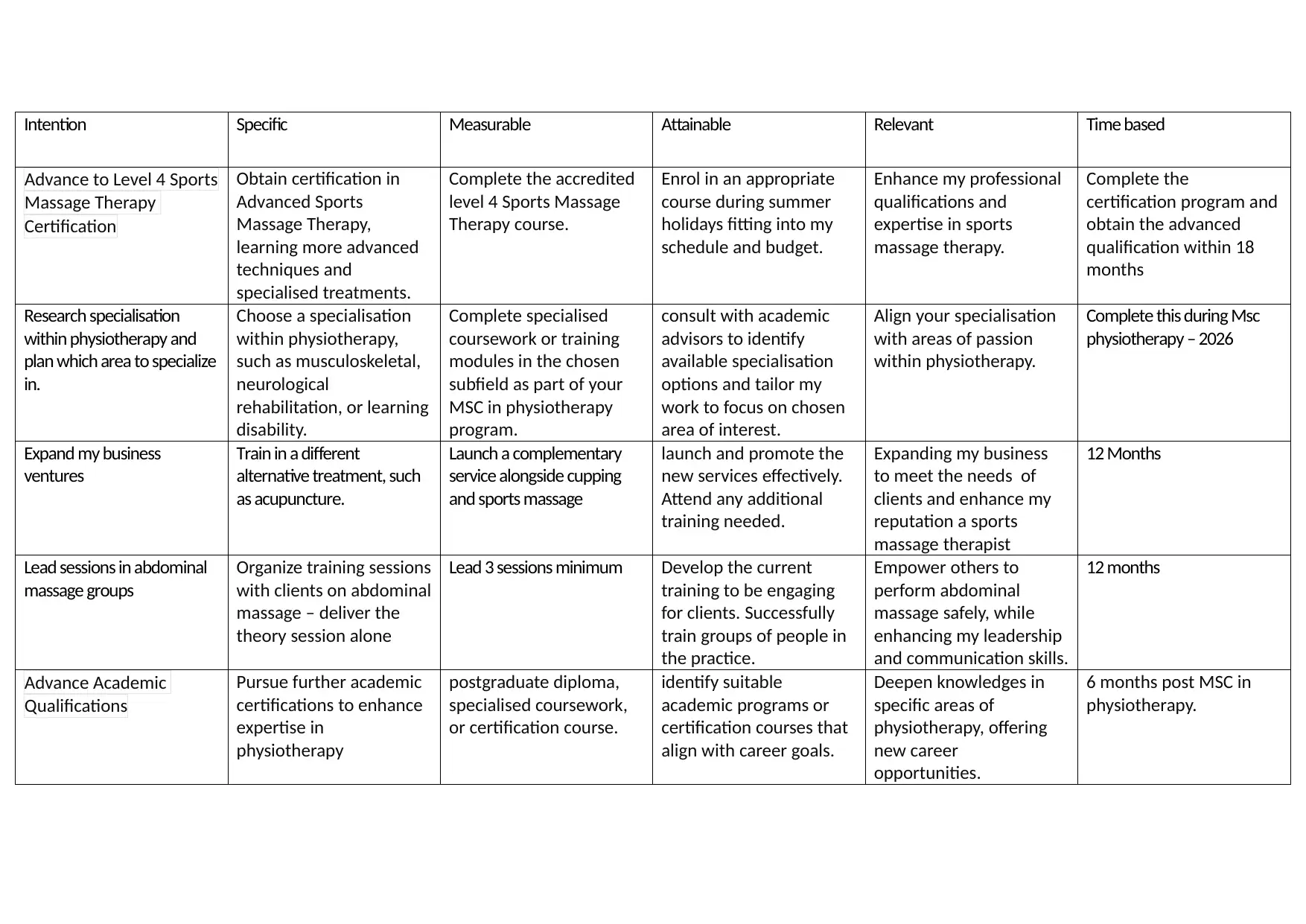
Intention Specific Measurable Attainable Relevant Time based
Advance to Level 4 Sports
Massage Therapy
Certification
Obtain certification in
Advanced Sports
Massage Therapy,
learning more advanced
techniques and
specialised treatments.
Complete the accredited
level 4 Sports Massage
Therapy course.
Enrol in an appropriate
course during summer
holidays fitting into my
schedule and budget.
Enhance my professional
qualifications and
expertise in sports
massage therapy.
Complete the
certification program and
obtain the advanced
qualification within 18
months
Research specialisation
within physiotherapy and
plan which area to specialize
in.
Choose a specialisation
within physiotherapy,
such as musculoskeletal,
neurological
rehabilitation, or learning
disability.
Complete specialised
coursework or training
modules in the chosen
subfield as part of your
MSC in physiotherapy
program.
consult with academic
advisors to identify
available specialisation
options and tailor my
work to focus on chosen
area of interest.
Align your specialisation
with areas of passion
within physiotherapy.
Complete this during Msc
physiotherapy – 2026
Expand my business
ventures
Train in a different
alternative treatment, such
as acupuncture.
Launch a complementary
service alongside cupping
and sports massage
launch and promote the
new services effectively.
Attend any additional
training needed.
Expanding my business
to meet the needs of
clients and enhance my
reputation a sports
massage therapist
12 Months
Lead sessions in abdominal
massage groups
Organize training sessions
with clients on abdominal
massage – deliver the
theory session alone
Lead 3 sessions minimum Develop the current
training to be engaging
for clients. Successfully
train groups of people in
the practice.
Empower others to
perform abdominal
massage safely, while
enhancing my leadership
and communication skills.
12 months
Advance Academic
Qualifications
Pursue further academic
certifications to enhance
expertise in
physiotherapy
postgraduate diploma,
specialised coursework,
or certification course.
identify suitable
academic programs or
certification courses that
align with career goals.
Deepen knowledges in
specific areas of
physiotherapy, offering
new career
opportunities.
6 months post MSC in
physiotherapy.
Advance to Level 4 Sports
Massage Therapy
Certification
Obtain certification in
Advanced Sports
Massage Therapy,
learning more advanced
techniques and
specialised treatments.
Complete the accredited
level 4 Sports Massage
Therapy course.
Enrol in an appropriate
course during summer
holidays fitting into my
schedule and budget.
Enhance my professional
qualifications and
expertise in sports
massage therapy.
Complete the
certification program and
obtain the advanced
qualification within 18
months
Research specialisation
within physiotherapy and
plan which area to specialize
in.
Choose a specialisation
within physiotherapy,
such as musculoskeletal,
neurological
rehabilitation, or learning
disability.
Complete specialised
coursework or training
modules in the chosen
subfield as part of your
MSC in physiotherapy
program.
consult with academic
advisors to identify
available specialisation
options and tailor my
work to focus on chosen
area of interest.
Align your specialisation
with areas of passion
within physiotherapy.
Complete this during Msc
physiotherapy – 2026
Expand my business
ventures
Train in a different
alternative treatment, such
as acupuncture.
Launch a complementary
service alongside cupping
and sports massage
launch and promote the
new services effectively.
Attend any additional
training needed.
Expanding my business
to meet the needs of
clients and enhance my
reputation a sports
massage therapist
12 Months
Lead sessions in abdominal
massage groups
Organize training sessions
with clients on abdominal
massage – deliver the
theory session alone
Lead 3 sessions minimum Develop the current
training to be engaging
for clients. Successfully
train groups of people in
the practice.
Empower others to
perform abdominal
massage safely, while
enhancing my leadership
and communication skills.
12 months
Advance Academic
Qualifications
Pursue further academic
certifications to enhance
expertise in
physiotherapy
postgraduate diploma,
specialised coursework,
or certification course.
identify suitable
academic programs or
certification courses that
align with career goals.
Deepen knowledges in
specific areas of
physiotherapy, offering
new career
opportunities.
6 months post MSC in
physiotherapy.
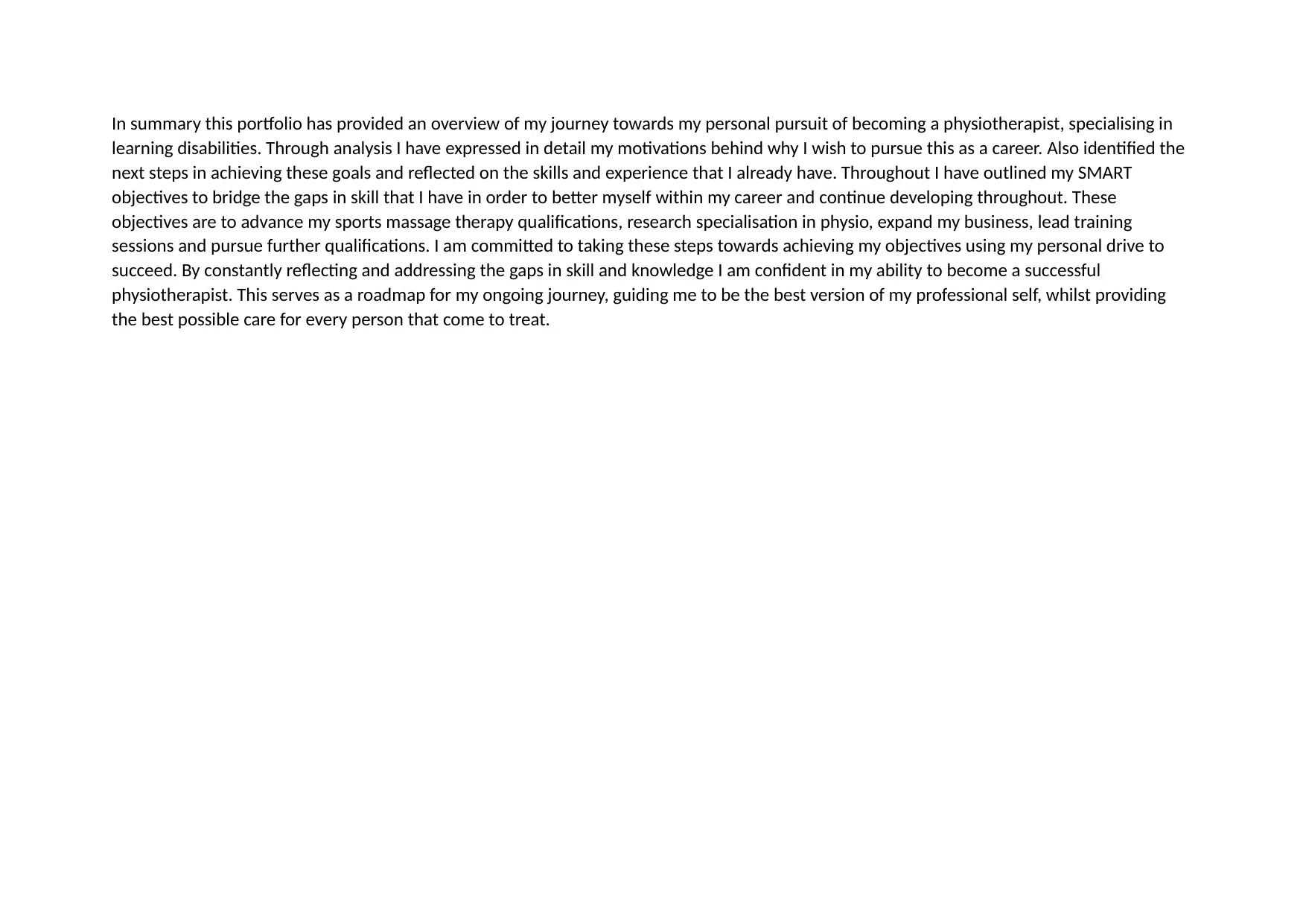
In summary this portfolio has provided an overview of my journey towards my personal pursuit of becoming a physiotherapist, specialising in
learning disabilities. Through analysis I have expressed in detail my motivations behind why I wish to pursue this as a career. Also identified the
next steps in achieving these goals and reflected on the skills and experience that I already have. Throughout I have outlined my SMART
objectives to bridge the gaps in skill that I have in order to better myself within my career and continue developing throughout. These
objectives are to advance my sports massage therapy qualifications, research specialisation in physio, expand my business, lead training
sessions and pursue further qualifications. I am committed to taking these steps towards achieving my objectives using my personal drive to
succeed. By constantly reflecting and addressing the gaps in skill and knowledge I am confident in my ability to become a successful
physiotherapist. This serves as a roadmap for my ongoing journey, guiding me to be the best version of my professional self, whilst providing
the best possible care for every person that come to treat.
learning disabilities. Through analysis I have expressed in detail my motivations behind why I wish to pursue this as a career. Also identified the
next steps in achieving these goals and reflected on the skills and experience that I already have. Throughout I have outlined my SMART
objectives to bridge the gaps in skill that I have in order to better myself within my career and continue developing throughout. These
objectives are to advance my sports massage therapy qualifications, research specialisation in physio, expand my business, lead training
sessions and pursue further qualifications. I am committed to taking these steps towards achieving my objectives using my personal drive to
succeed. By constantly reflecting and addressing the gaps in skill and knowledge I am confident in my ability to become a successful
physiotherapist. This serves as a roadmap for my ongoing journey, guiding me to be the best version of my professional self, whilst providing
the best possible care for every person that come to treat.
Secure Best Marks with AI Grader
Need help grading? Try our AI Grader for instant feedback on your assignments.
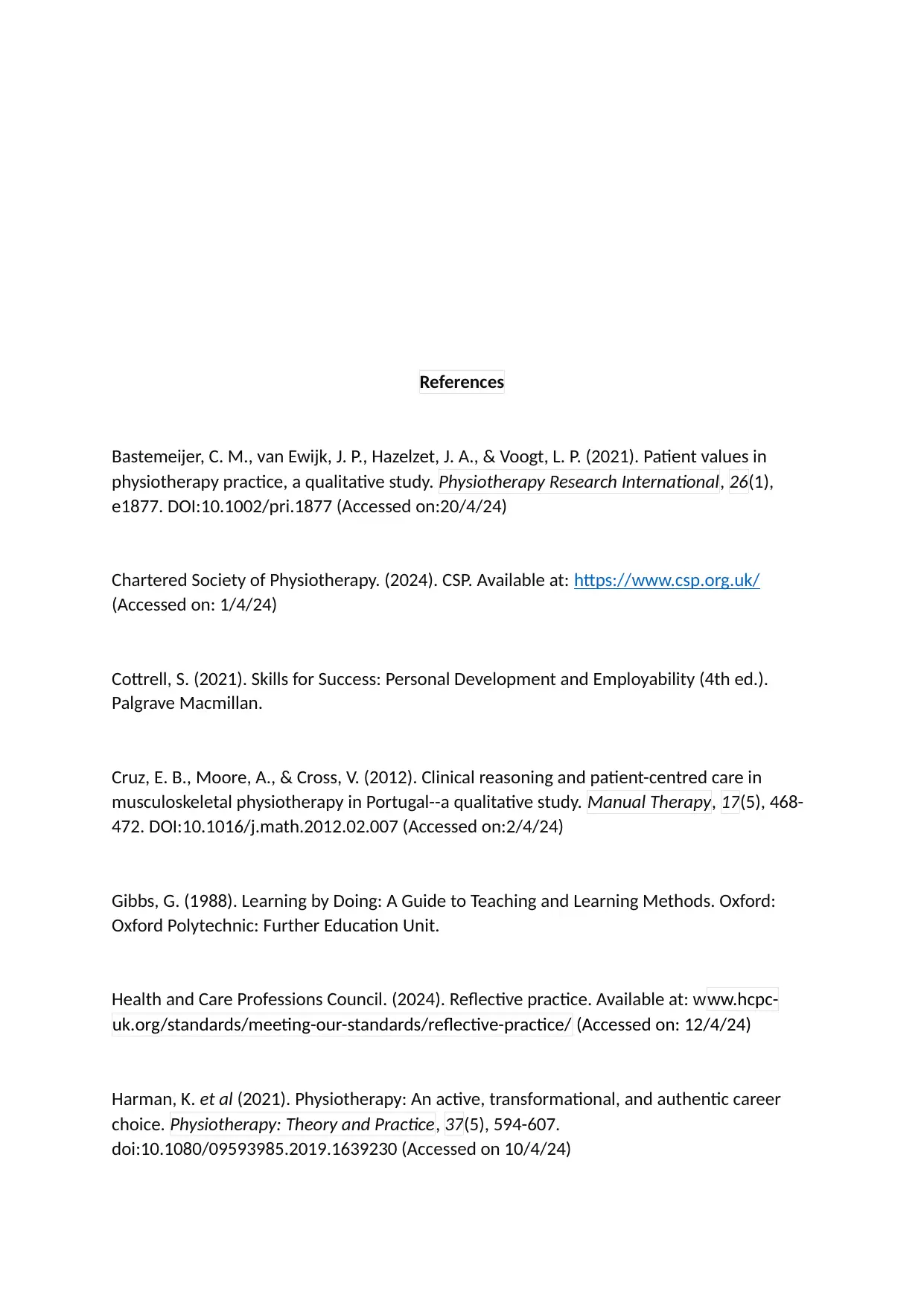
References
Bastemeijer, C. M., van Ewijk, J. P., Hazelzet, J. A., & Voogt, L. P. (2021). Patient values in
physiotherapy practice, a qualitative study. Physiotherapy Research International, 26(1),
e1877. DOI:10.1002/pri.1877 (Accessed on:20/4/24)
Chartered Society of Physiotherapy. (2024). CSP. Available at: https://www.csp.org.uk/
(Accessed on: 1/4/24)
Cottrell, S. (2021). Skills for Success: Personal Development and Employability (4th ed.).
Palgrave Macmillan.
Cruz, E. B., Moore, A., & Cross, V. (2012). Clinical reasoning and patient-centred care in
musculoskeletal physiotherapy in Portugal--a qualitative study. Manual Therapy, 17(5), 468-
472. DOI:10.1016/j.math.2012.02.007 (Accessed on:2/4/24)
Gibbs, G. (1988). Learning by Doing: A Guide to Teaching and Learning Methods. Oxford:
Oxford Polytechnic: Further Education Unit.
Health and Care Professions Council. (2024). Reflective practice. Available at: www.hcpc-
uk.org/standards/meeting-our-standards/reflective-practice/ (Accessed on: 12/4/24)
Harman, K. et al (2021). Physiotherapy: An active, transformational, and authentic career
choice. Physiotherapy: Theory and Practice, 37(5), 594-607.
doi:10.1080/09593985.2019.1639230 (Accessed on 10/4/24)
Bastemeijer, C. M., van Ewijk, J. P., Hazelzet, J. A., & Voogt, L. P. (2021). Patient values in
physiotherapy practice, a qualitative study. Physiotherapy Research International, 26(1),
e1877. DOI:10.1002/pri.1877 (Accessed on:20/4/24)
Chartered Society of Physiotherapy. (2024). CSP. Available at: https://www.csp.org.uk/
(Accessed on: 1/4/24)
Cottrell, S. (2021). Skills for Success: Personal Development and Employability (4th ed.).
Palgrave Macmillan.
Cruz, E. B., Moore, A., & Cross, V. (2012). Clinical reasoning and patient-centred care in
musculoskeletal physiotherapy in Portugal--a qualitative study. Manual Therapy, 17(5), 468-
472. DOI:10.1016/j.math.2012.02.007 (Accessed on:2/4/24)
Gibbs, G. (1988). Learning by Doing: A Guide to Teaching and Learning Methods. Oxford:
Oxford Polytechnic: Further Education Unit.
Health and Care Professions Council. (2024). Reflective practice. Available at: www.hcpc-
uk.org/standards/meeting-our-standards/reflective-practice/ (Accessed on: 12/4/24)
Harman, K. et al (2021). Physiotherapy: An active, transformational, and authentic career
choice. Physiotherapy: Theory and Practice, 37(5), 594-607.
doi:10.1080/09593985.2019.1639230 (Accessed on 10/4/24)
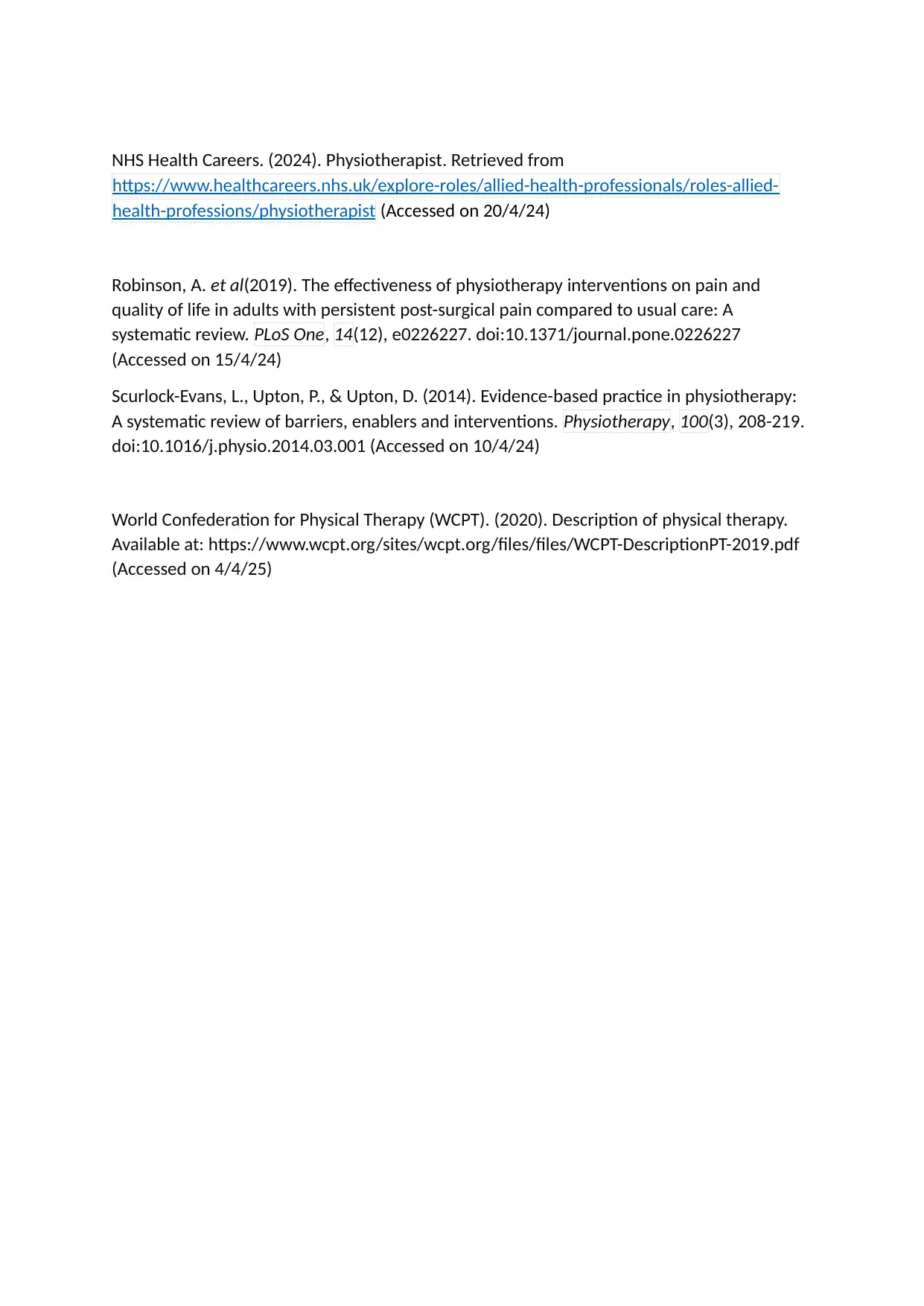
NHS Health Careers. (2024). Physiotherapist. Retrieved from
https://www.healthcareers.nhs.uk/explore-roles/allied-health-professionals/roles-allied-
health-professions/physiotherapist (Accessed on 20/4/24)
Robinson, A. et al(2019). The effectiveness of physiotherapy interventions on pain and
quality of life in adults with persistent post-surgical pain compared to usual care: A
systematic review. PLoS One, 14(12), e0226227. doi:10.1371/journal.pone.0226227
(Accessed on 15/4/24)
Scurlock-Evans, L., Upton, P., & Upton, D. (2014). Evidence-based practice in physiotherapy:
A systematic review of barriers, enablers and interventions. Physiotherapy, 100(3), 208-219.
doi:10.1016/j.physio.2014.03.001 (Accessed on 10/4/24)
World Confederation for Physical Therapy (WCPT). (2020). Description of physical therapy.
Available at: https://www.wcpt.org/sites/wcpt.org/files/files/WCPT-DescriptionPT-2019.pdf
(Accessed on 4/4/25)
https://www.healthcareers.nhs.uk/explore-roles/allied-health-professionals/roles-allied-
health-professions/physiotherapist (Accessed on 20/4/24)
Robinson, A. et al(2019). The effectiveness of physiotherapy interventions on pain and
quality of life in adults with persistent post-surgical pain compared to usual care: A
systematic review. PLoS One, 14(12), e0226227. doi:10.1371/journal.pone.0226227
(Accessed on 15/4/24)
Scurlock-Evans, L., Upton, P., & Upton, D. (2014). Evidence-based practice in physiotherapy:
A systematic review of barriers, enablers and interventions. Physiotherapy, 100(3), 208-219.
doi:10.1016/j.physio.2014.03.001 (Accessed on 10/4/24)
World Confederation for Physical Therapy (WCPT). (2020). Description of physical therapy.
Available at: https://www.wcpt.org/sites/wcpt.org/files/files/WCPT-DescriptionPT-2019.pdf
(Accessed on 4/4/25)
1 out of 6
Related Documents
Your All-in-One AI-Powered Toolkit for Academic Success.
+13062052269
info@desklib.com
Available 24*7 on WhatsApp / Email
![[object Object]](/_next/static/media/star-bottom.7253800d.svg)
Unlock your academic potential
© 2024 | Zucol Services PVT LTD | All rights reserved.





